新概念英语第二册Lesson1.A private conversation课件(共13张PPT)
文档属性
| 名称 | 新概念英语第二册Lesson1.A private conversation课件(共13张PPT) | 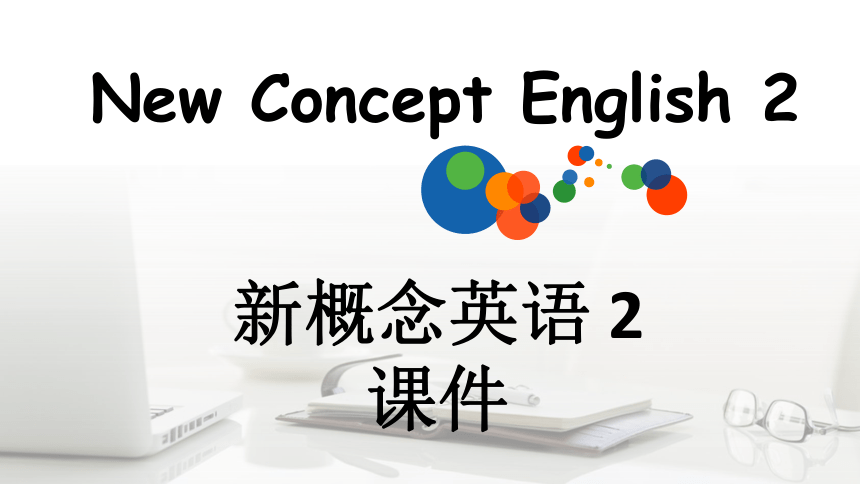 | |
| 格式 | zip | ||
| 文件大小 | 6.7MB | ||
| 资源类型 | 试卷 | ||
| 版本资源 | 新概念英语 | ||
| 科目 | 英语 | ||
| 更新时间 | 2021-09-16 08:18:22 | ||
图片预览

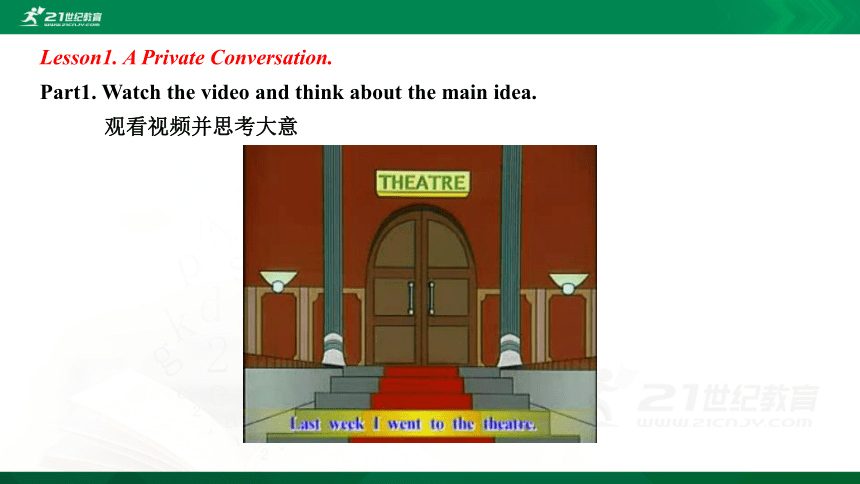
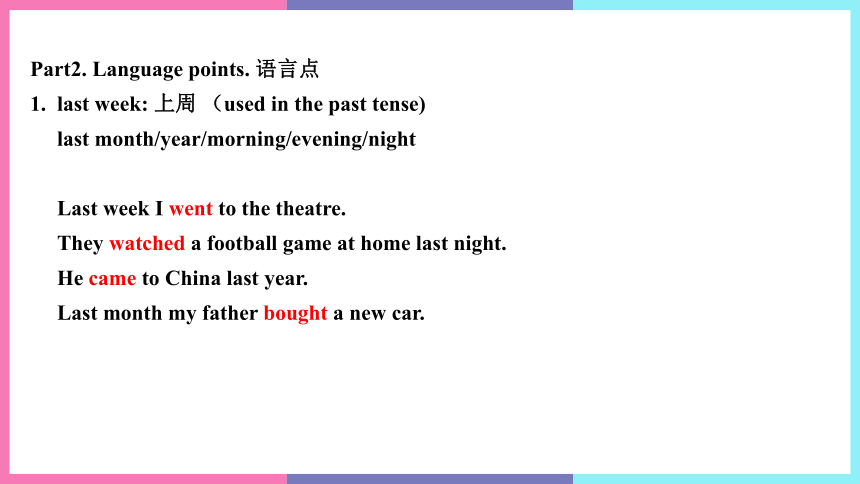
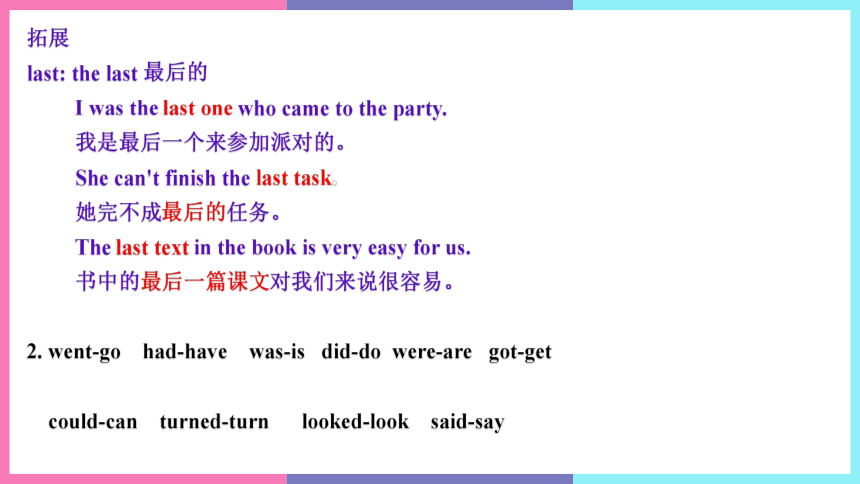
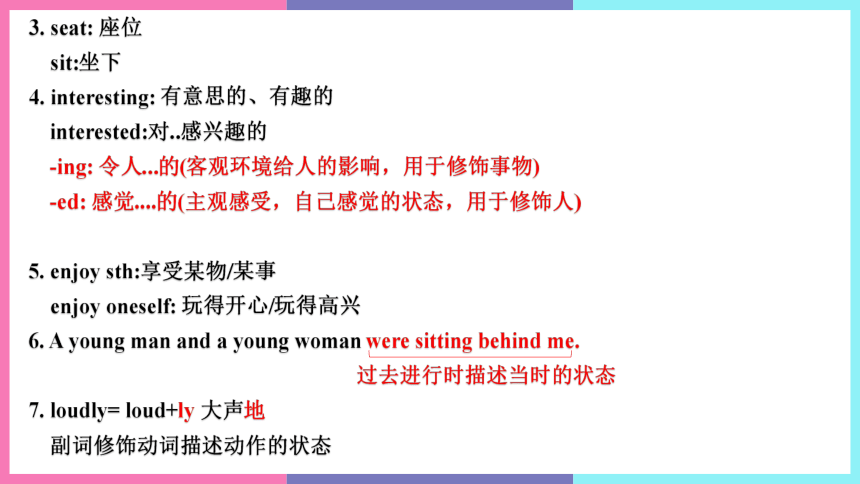
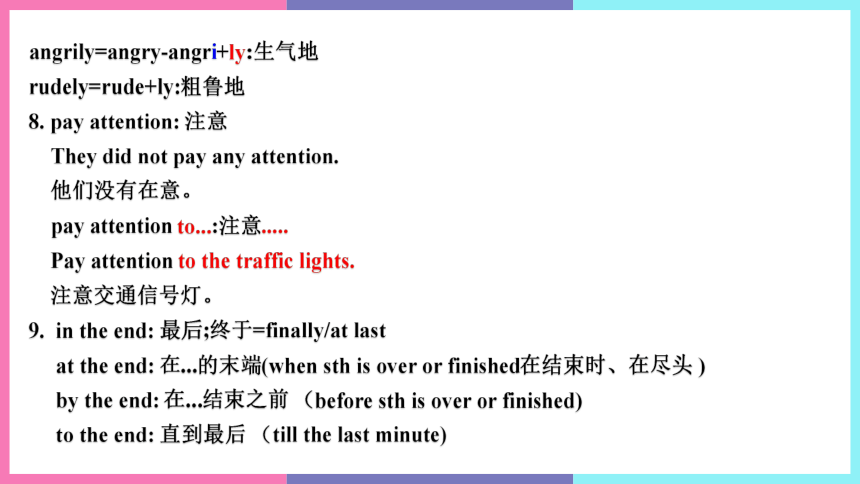
文档简介
(共13张PPT)
New
Concept
English
2
新概念英语
2
课件
Lesson1.
A
Private
Conversation.
Part1.
Watch
the
video
and
think
about
the
main
idea.
观看视频并思考大意
Part2.
Language
points.
语言点
1.
last
week:
上周
(used
in
the
past
tense)
last
month/year/morning/evening/night
Last
week
I
went
to
the
theatre.
They
watched
a
football
game
at
home
last
night.
He
came
to
China
last
year.
Last
month
my
father
bought
a
new
car.
拓展
last:
the
last
最后的
I
was
the
last
one
who
came
to
the
party.
我是最后一个来参加派对的。
She
can't
finish
the
last
task.
她完不成最后的任务。
The
last
text
in
the
book
is
very
easy
for
us.
书中的最后一篇课文对我们来说很容易。
2.
went-go
had-have
was-is
did-do
were-are
got-get
could-can
turned-turn
looked-look
said-say
3.
seat:
座位
sit:坐下
4.
interesting:
有意思的、有趣的
interested:对..感兴趣的
-ing:
令人...的(客观环境给人的影响,用于修饰事物)
-ed:
感觉....的(主观感受,自己感觉的状态,用于修饰人)
5.
enjoy
sth:享受某物/某事
enjoy
oneself:
玩得开心/玩得高兴
6.
A
young
man
and
a
young
woman
were
sitting
behind
me.
过去进行时描述当时的状态
7.
loudly=
loud+ly
大声地
副词修饰动词描述动作的状态
angrily=angry-angri+ly:生气地
rudely=rude+ly:粗鲁地
8.
pay
attention:
注意
They
did
not
pay
any
attention.
他们没有在意。
pay
attention
to...:注意.....
Pay
attention
to
the
traffic
lights.
注意交通信号灯。
9.
in
the
end:
最后;终于=finally/at
last
at
the
end:
在...的末端(when
sth
is
over
or
finished在结束时、在尽头
)
by
the
end:
在...结束之前
(before
sth
is
over
or
finished)
to
the
end:
直到最后
(till
the
last
minute)
10.
bear:
to
endure
sth/sb
bear
sth/sb:
忍受某事/某人
bear-bore-born
11.
turn
round:
扭头/转身
=turn
around
12.
It's
none
of
your
business.
与你无关!不关你的事!
business:
事情/商务
be
on
business:
出差
My
father
is
on
business
this
week.
我爸爸这周出差。
13.
private:
私人的、私密的
反义词:
public:公开的、公共的
易混词:
open:
开放的
quiet:
内向的
Part3.
Sentences.句型
Statement:陈述句
叙述一件事情、一个事实、一个规律、一个状态等。
常用结构:主语+谓语
(s+v)
I
left.我离开了。
主语+谓语+宾语(s+v+o)
I
left
him.
我离开了他。
主语+系+表语
(s+v+c)
I
was
at
home.我在家.
She
becomes
a
lawyer.她成了一名律师。
一般过去时的陈述句
肯定句:主语+过去式+宾/表+
(地点/时间)
I
went
to
the
theatre.
I
had
a
very
good
seat.
The
play
was
very
interesting.
否定句:主语+didn't+动词原形+宾语+(时间/地点)
主语+wasn't/weren't+表语。
I
did
not
enjoy
it.
They
did
not
pay
any
attention.
I
wasn't
at
home
last
night.
其它词语的位置
1.
表示时间:可在句首或句尾
(时间状语)
Last
week
I
went
to
the
theatre.
I
went
to
the
theatre
last
week.
2.
表示动作的频率副词:在动词前
often,
usually,
always,
sometimes,
never,
rarely
She
often
walked
to
school
when
she
was
twelve
years
old.
在她十二岁的时候,她常常走着去上学。
He
never
made
noise
in
the
class
before.
以前他从不在班里大声喧哗。
频率词组多在动词之后或者句末
once
a
day/week/month/year
twice
a
day/week/month/year
three
times
a
day/week/month/year
3.
表示动作状态的词语:多放在动词后
(副词)
I
said
angrily.
我生气地说。
The
young
man
said
rudely.
那个年轻人粗鲁地说。
4.
描述人、事、物状态或特点的词语:多在名词前或be动词之后
(定语/表语)
I
got
a
very
good
seat.
我有一个好座位。/我的座位很好。(定语)
The
play
was
very
interesting.
戏很有意思。(表语)
Part4.
Summary
Writing
常见疑问句提问内容和回答方式
1.
Where....:
询问地点。
回答时可以直接写地点或在句子末尾加地点。
2.
Who..:询问人物
回答时可以给出人物名称
3.
What...:
询问内容
回答时给出具体内容或者用名词回答
4.
When...:询问时间
回答时可直接给出时间词语,或者在句子开头/末尾加入时间词语
5.
How..:询问方式或状态
回答时给出表示方式的内容或者描述状态的形容词、副词等
6.
一般疑问句:用来确认是否属实
回答时:Yes,主语+疑问词肯定式。/No,
主语+疑问词否定式。
谢谢
21世纪教育网(www.21cnjy.com)
中小学教育资源网站
有大把高质量资料?一线教师?一线教研员?
欢迎加入21世纪教育网教师合作团队!!月薪过万不是梦!!
详情请看:
https://www.21cnjy.com/help/help_extract.php
New
Concept
English
2
新概念英语
2
课件
Lesson1.
A
Private
Conversation.
Part1.
Watch
the
video
and
think
about
the
main
idea.
观看视频并思考大意
Part2.
Language
points.
语言点
1.
last
week:
上周
(used
in
the
past
tense)
last
month/year/morning/evening/night
Last
week
I
went
to
the
theatre.
They
watched
a
football
game
at
home
last
night.
He
came
to
China
last
year.
Last
month
my
father
bought
a
new
car.
拓展
last:
the
last
最后的
I
was
the
last
one
who
came
to
the
party.
我是最后一个来参加派对的。
She
can't
finish
the
last
task.
她完不成最后的任务。
The
last
text
in
the
book
is
very
easy
for
us.
书中的最后一篇课文对我们来说很容易。
2.
went-go
had-have
was-is
did-do
were-are
got-get
could-can
turned-turn
looked-look
said-say
3.
seat:
座位
sit:坐下
4.
interesting:
有意思的、有趣的
interested:对..感兴趣的
-ing:
令人...的(客观环境给人的影响,用于修饰事物)
-ed:
感觉....的(主观感受,自己感觉的状态,用于修饰人)
5.
enjoy
sth:享受某物/某事
enjoy
oneself:
玩得开心/玩得高兴
6.
A
young
man
and
a
young
woman
were
sitting
behind
me.
过去进行时描述当时的状态
7.
loudly=
loud+ly
大声地
副词修饰动词描述动作的状态
angrily=angry-angri+ly:生气地
rudely=rude+ly:粗鲁地
8.
pay
attention:
注意
They
did
not
pay
any
attention.
他们没有在意。
pay
attention
to...:注意.....
Pay
attention
to
the
traffic
lights.
注意交通信号灯。
9.
in
the
end:
最后;终于=finally/at
last
at
the
end:
在...的末端(when
sth
is
over
or
finished在结束时、在尽头
)
by
the
end:
在...结束之前
(before
sth
is
over
or
finished)
to
the
end:
直到最后
(till
the
last
minute)
10.
bear:
to
endure
sth/sb
bear
sth/sb:
忍受某事/某人
bear-bore-born
11.
turn
round:
扭头/转身
=turn
around
12.
It's
none
of
your
business.
与你无关!不关你的事!
business:
事情/商务
be
on
business:
出差
My
father
is
on
business
this
week.
我爸爸这周出差。
13.
private:
私人的、私密的
反义词:
public:公开的、公共的
易混词:
open:
开放的
quiet:
内向的
Part3.
Sentences.句型
Statement:陈述句
叙述一件事情、一个事实、一个规律、一个状态等。
常用结构:主语+谓语
(s+v)
I
left.我离开了。
主语+谓语+宾语(s+v+o)
I
left
him.
我离开了他。
主语+系+表语
(s+v+c)
I
was
at
home.我在家.
She
becomes
a
lawyer.她成了一名律师。
一般过去时的陈述句
肯定句:主语+过去式+宾/表+
(地点/时间)
I
went
to
the
theatre.
I
had
a
very
good
seat.
The
play
was
very
interesting.
否定句:主语+didn't+动词原形+宾语+(时间/地点)
主语+wasn't/weren't+表语。
I
did
not
enjoy
it.
They
did
not
pay
any
attention.
I
wasn't
at
home
last
night.
其它词语的位置
1.
表示时间:可在句首或句尾
(时间状语)
Last
week
I
went
to
the
theatre.
I
went
to
the
theatre
last
week.
2.
表示动作的频率副词:在动词前
often,
usually,
always,
sometimes,
never,
rarely
She
often
walked
to
school
when
she
was
twelve
years
old.
在她十二岁的时候,她常常走着去上学。
He
never
made
noise
in
the
class
before.
以前他从不在班里大声喧哗。
频率词组多在动词之后或者句末
once
a
day/week/month/year
twice
a
day/week/month/year
three
times
a
day/week/month/year
3.
表示动作状态的词语:多放在动词后
(副词)
I
said
angrily.
我生气地说。
The
young
man
said
rudely.
那个年轻人粗鲁地说。
4.
描述人、事、物状态或特点的词语:多在名词前或be动词之后
(定语/表语)
I
got
a
very
good
seat.
我有一个好座位。/我的座位很好。(定语)
The
play
was
very
interesting.
戏很有意思。(表语)
Part4.
Summary
Writing
常见疑问句提问内容和回答方式
1.
Where....:
询问地点。
回答时可以直接写地点或在句子末尾加地点。
2.
Who..:询问人物
回答时可以给出人物名称
3.
What...:
询问内容
回答时给出具体内容或者用名词回答
4.
When...:询问时间
回答时可直接给出时间词语,或者在句子开头/末尾加入时间词语
5.
How..:询问方式或状态
回答时给出表示方式的内容或者描述状态的形容词、副词等
6.
一般疑问句:用来确认是否属实
回答时:Yes,主语+疑问词肯定式。/No,
主语+疑问词否定式。
谢谢
21世纪教育网(www.21cnjy.com)
中小学教育资源网站
有大把高质量资料?一线教师?一线教研员?
欢迎加入21世纪教育网教师合作团队!!月薪过万不是梦!!
详情请看:
https://www.21cnjy.com/help/help_extract.php
同课章节目录
